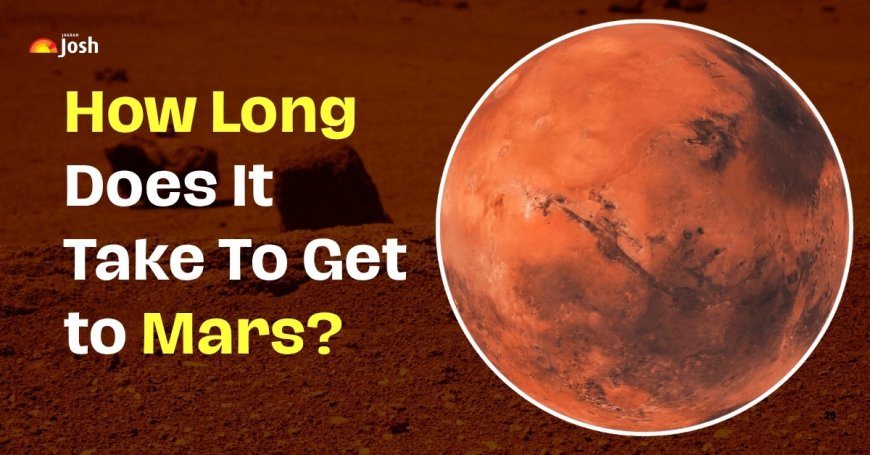How Long Does It Take to Travel to Mars?
Traveling to Mars is a long journey! The average time it takes to get from Earth to Mars is about nine months. NASA's Perseverance rover, for example, took around 7 months to reach Mars. SpaceX aims to reduce this time to 3 to 5 months in the future. The distance between Earth and Mars varies, with the closest recorded approach being 56 million km. Find out more about the duration of a trip to Mars in this article.

It only takes a few minutes to get to space! Rockets hit the boundary of space, approximately 100 km above Earth, in around 8-10 minutes. It takes at most a couple of hours to get to the ISS in orbit. The journey to Mars becomes a much longer one. Mars revolves around the Sun approximately 225 million km away from Earth on average. Its distance at closest approach is 56 million km. With the standard route, the Hohmann transfer, it takes approximately nine months to get from Earth to Mars. That's the path taken by the majority of robotic missions. SpaceX schedules voyages over 80–150 days, an average of just 115, by striking the perfect orbit window to launch. NASA's Perseverance rover, which launched in July 2020, landed in February 2021—a 29‑week, or about 7‑month, journey. In this article, we'll get to know how long it takes to get to Mars.
Getting to space doesn't take very long. A rocket can reach the edge of space in about 8 to 10 minutes. This point is around 100 kilometres above Earth. After launch, astronauts or spacecraft can be in Earth's orbit in less than an hour. However, travelling beyond Earth's orbit, such as to the Moon or Mars, takes significantly more time.
To determine how long it will take to reach Mars, we must first know the distance between the two planets. Mars is the fourth planet from the sun, and the second closest to Earth (Venus is the nearest). However, the distance between Earth and Mars changes constantly as they orbit the Sun. In theory, the closest that Earth and Mars would approach each other would be when Mars is at its closest point to the sun (perihelion) and Earth is at its farthest (aphelion). This would put the planets only 33.9 million miles (54.6 million kilometres) apart.
However, this has never happened in recorded history. The closest recorded approach of the two planets occurred in 2003 when they were only 34.8 million miles (56 million km) apart. The two planets are farthest apart when they are both at their farthest from the sun, on opposite sides of the star. At this point, they can be 250 million miles (401 million km) apart. The average distance between Earth and Mars is 140 million miles (225 million km).
A trip to Mars takes much longer than a trip to space. Most missions to Mars typically take between 6 and 9 months. For example, NASA's Perseverance rover took about 7 months to reach Mars. The exact time depends on the speed of the spacecraft and the positions of Earth and Mars. Some future missions, such as those planned by SpaceX, may reduce the travel time to approximately 3 to 5 months. But for now, travelling to Mars takes more than half a year.
The fastest spacecraft ever is NASA's Parker Solar Probe. It reached a record speed of 430,000 miles per hour (692,000 km/h) on December 24, 2024. It was designed to study the Sun, not to travel to Mars, but if it could fly straight from Earth to Mars, here's how fast the trip could be:
Closest possible distance: 3.3 days (78.84 hours)
Closest recorded distance (2003): 3.4 days (80.93 hours)
Farthest distance: 24.2 days (581.4 hours)
Average distance: 13.6 days (325.58 hours)
These are theoretical times, but they illustrate how quickly space travel could become a reality in the future.
What is the Temperature on Mars?
Average surface temperature: Around –65 °C (–85 °F).
Daytime highs near the equator: Can reach +20 °C (70 °F).
Nighttime lows: Often drop to –100 °C (–150°F), especially in winter.
Extreme lows at the poles: Down to –125 °C to –195 °F (–125 °C) in winter.
Typical daily swings: A single day might warm from –80 °C in the morning to 0–20 °C at noon near the equator.
What's Your Reaction?
 Like
0
Like
0
 Dislike
0
Dislike
0
 Love
0
Love
0
 Funny
0
Funny
0
 Angry
0
Angry
0
 Sad
0
Sad
0
 Wow
0
Wow
0






































































































































































